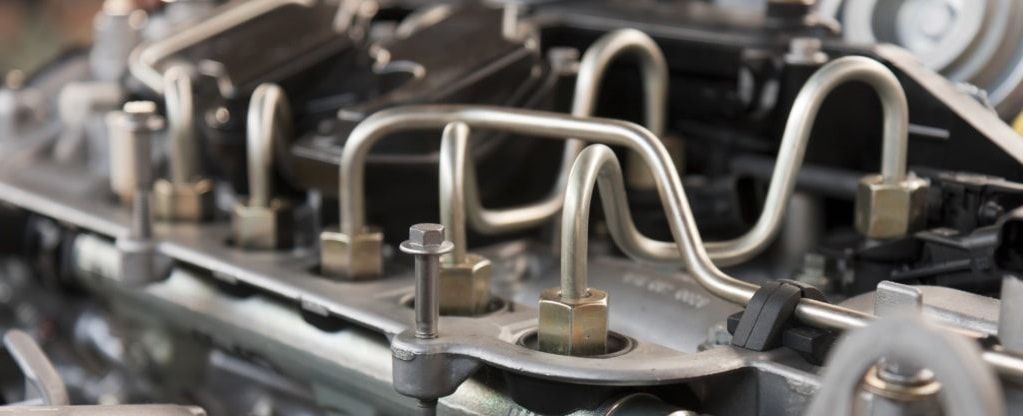
Best Fuel Injector Cleaner in 2022– Top 7 Picks (Buying Guide & FAQ)
Fuel injectors are the viaduct between a tank of gas and your engine using gasoline. They’re critically utilized every time you start the vehicle up. Cleaning fuel injectors adequately keep your mpg accurate, minimizes noise in the engine block, and eliminates motor rattling while reducing emission output. The right fuel system cleaner can decrease maintenance frequency and enhance the car’s overall performance. We’ll help you choose the best fuel injector cleaner on the market, which is recommended by car repair experts and online reviews from verified purchases.
The best fuel injector cleaner list has been published back in 2019, but we update the page with the best products as soon as they hit the shelves and online stores. July 2021 update included not just new solutions on the market, but also unique information to help you choose the best fuel system cleaner for your vehicle – how to choose cleaning fuel injector additives, how to use it, how much and how often, what is the difference between injector cleaners and octane booster, can it damage your engine, and finally – which fuel injector cleaner works best. Make sure to bookmark this page as the ultimate buyer’s guide.
Before You Buy
Here are some important considerations to keep in mind before buying a particular product:
- Frequency of use: Although you should follow the manufacturer’s guidelines and mechanic’s advice, the frequency of service depends on your vehicle. Factors such as your car’s performance and how it reacts to fuel cleaner are essential when thinking about how often to use the product.
- Driving habits: If you drive in harsh weather conditions or get stuck in traffic often, your car may be more prone to carbon buildup. These conditions may affect your fuel system and require you to use cleaners more frequently.
- Quality of fuel: In terms of purity, we must agree that regular gas is a worse option than premium gas. So, if you’re using cheaper fuel, an injector cleaner can significantly enhance your driving experience.
- Mileage: The more miles you drive without cleaning the vehicle’s fuel system, the more impurities will build.
- Compatibility: Most fuel injector cleaners work with both diesel and gasoline engines, but some products can work with only one of them. So, be careful when buying a cleaner since the wrong one may damage your engine permanently.
What is the Best Fuel Injector Cleaner?
Whether you’re a fan of frequent fuel system cleaning or need a quick boost in your car’s performance, we’ve reviewed some terrific options. Here are our 7 picks for the best fuel system cleaners in 2022.
1. Chevron Techron Concentrate Plus – The Best Fuel Injector Cleaner
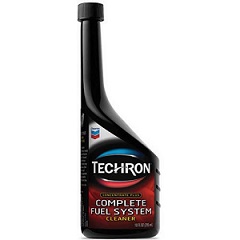
This is the best-rated fuel injector on the market, has great user reviews, and it’s one of the most popular products on Amazon. Plus, this additive is often recommended by car manufacturers as a solution for cleaning the fuel injection system. It works on lighter vehicles of all kinds, fuel-injected or carbureted engines. The solution will also work on two-stroke motorcycles, just make sure to add lower amounts in the tank – as much as it’s recommended on the product instructions.
According to the manufacturer, it’ll clean and restore the complete fuel system, including the fuel injectors, combustion chambers, and intake valves. Recommended usage is every 3,000 miles for trucks and cars, or right before oil change. For engines that don’t have a counter, like a lawnmower, use it as required.
Many users claimed this solution made a noticeable difference in their vehicle’s performance.
PROS// Works well to clean older engines; Enhances fuel efficiency; Improves cold starts; Operates on the entire system.
CONS// Best results require repeated use.
2. Red Line Fuel Cleaner – Best Gas Additive
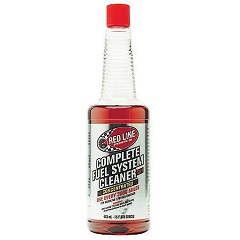
Red Line Fuel Cleaner is known to work with almost 100% accuracy and performance. Plus, the additive contains the highest quantity per dollar concentration of polyether amines (PEA), which is well known for its exceptional cleaning properties.
Plus, the 15-ounce bottle it comes in is more than enough for your vehicle’s tank size, making it a budget option for auto-mechanics and car owners worldwide. This strong concentrated detergent is supported by synthetic cylinder lubricants as well. It goes beyond fuel injectors into improving combustion chambers, valves, and other auto components. The product is also highly cost-effective, and you’ll notice the difference instantly.
PROS// Available as a 15oz bottle; Full efficiency in one treatment; Easy to use/apply; Accurate, high-performance product;
CONS// Not suitable for all vehicles.
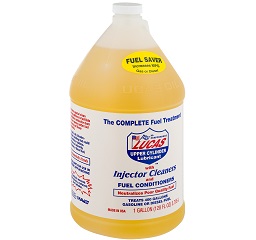
Lucas Fuel System Cleaner goes beyond acting as a fuel injector cleaner. It’s a fuel conditioner too, which means it thoroughly rejuvenates your fuel injection system, thus improving your vehicle’s overall performance.
Another upvote to invest in this solution is that unlike other additives on the market, it can clean up to 400 gallons of gas or diesel fuel. This capacity makes this product a versatile and flexible choice among car owners. Also, it augments the functionality of both your injectors and pumps. This cleaner is an overall solution to your fuel injection cleaning issues.
Once you add it, you’ll instantly experience a more efficient and smoother driving. Be careful when buying this solution, since (thanks to its popularity) many people manufacture fake versions of this additive.
PROS// Amazon’s Choice product; Available as a 1-gallon container; For automotive performance parts; Works in gas and diesel engines.
CONS// Not recommended for unleaded fuel.
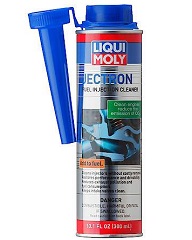
Originally produced in Germany, Liqui Molly’s main ingredient that delivered it the high rates is Molybdenum disulfide. A potent additive for cleaning fuel injectors and carbon build-up, particularly for vehicles with older engines. It’s one of the quickest solutions on the market – refinements can be seen after only one tank of fuel or 1,000 miles.
The product was also tested by the strict TUV (Technical Inspection Association) in Germany, so it’s one of the safest fuel injector cleaners on the Amazon. The company claims that it’ll also not damage catalytic converters or oxygen sensors. One bottle is suitable for one tank of fuel.
PROS// Available as a 300 ml bottle; Full range with more than 4,000 items; Easy to use and apply; High performance and mileage;
CONS// A small amount of fuel cleaner.

Royal Purple Max Cleaner completely eradicates any issues with stalling and hesitation on the part of your engine and gives your vehicle an enhanced fuel economy. The product also works for an extended period and stays in vehicle for a considerable time after usage, so you can enjoy that peak performance for much longer. With this additive, you can experience improved horsepower and lowered harmful emissions.
The additive deeply cleans and penetrates your fuel injector system and revitalizes your intake valves, carburetors, and combustion chambers. It even works for 2 cycle, 4 cycle, gasoline, and diesel engines. With one use, you get so much increase in the performance of your fuel and engine, with superior resistance to destabilization, oxidation, corrosion, and premature spark plug fouling.
PROS// Available as a 20 oz spray; Comes in 1 and 6 pack; Highly versatile; Easy to use.
CONS// Some users report decreased mileage despite improved power.
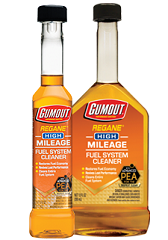
Gumout High Mileage Fuel Injector Cleaner is formulated to eliminate carbon deposits in engines with over 75k miles so you can enjoy a reestablished engine performance and an increased fuel economy. This additive will continuously lubricate your fuel injector system for the foreseeable future, so you don’t need to worry about stubborn sediments and carbon deposits.
Furthermore, the product will deliver superior protection for the engine block’s different components and parts, unclog the injectors, and bring them back to the start of the assembly line when it comes to longevity, durability, and performance. It’s an oxygen sensor safe, and it’s safe for turbocharged and supercharged vehicles, as well. With this, you can easily refill a near-empty tank and run it up to about 3k miles before it requires any more replacement.
PROS// Available as a 6 oz bottle; Comes in 1 and 6 pack; Oxygen sensor safe; Good value for money.
CONS// It doesn’t work on all types of vehicles.
7. Stanadyne Performance – Best Diesel Fuel Injector Cleaner
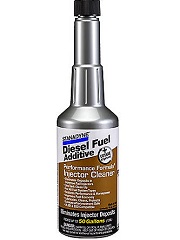
This is the best diesel injector cleaner on the list simply because it has been made by the same manufacturer that develops the fuel injectors. This additive is best known for improving engine performance, both in terms of specifications and practicality.
It does a great job adding horsepower and boosting fuel efficiency, but it’s even more noticeable for the dampened engine noises and reduced stuttering. The product also dramatically reduces corrosion and delivers a good volume of lubrication to the motor.
PROS// Increases fuel consumption, power, and performance; Prolongs the life of an engine; Reduces the noise and eliminates black smoke; Only one bottle is enough.
CONS// On certain vehicles, it can’t restore horsepower for some respectable amount.
Fuel Injector Cleaner Buying Guide
Maintain your fuel injectors, and you’ll upkeep peak performance. As such a critical component to your engine, you have to know every possible issue that can occur, and how to adequately clean them to ensure there are no repeat mistakes. Here is a list of the most important things about injections cleaners to consider before buying.
Types
- Dissolvents – The most common type of fuel injection cleaner is a dissolvent. These additives generally use PEA to break down carbon composites. Over time, the fuel’s impurities begin to build up in the vehicle’s injector and combustion chamber. Dissolving the build-up into smaller fragments will enable them to be ejected through the exhaust system;
- Detergents – The much less common form of fuel additive is a detergent. There is a lot of filler over whether or not these help to clean out your fuel system—with most folks believing that dissolving is the best solution. Detergents work by triggering chemicals that force carbon deposits to make their way out of the fuel system.
Benefits of Using Fuel System Cleaners
- Gas mileage – Cleaning out the carbon deposits in the vehicle’s fuel system improves the overall gas mileage of your car. This makes utilizing fuel cleaner great for both your wallet and environment;
- Performance – An engine that’s caked with deposits needs to work harder, meaning you aren’t achieving the wanted results. Keeping it pristine with fuel additives can help you to attain the full potential of the vehicle;
- Lower maintenance costs – Some people claim that frequent use of additives will cost you more in the long run. Still, knowing the best fuel cleaner for your situation can lower the car’s maintenance The mileage, the type of fuel, and how often you use these fuel cleaners are all critical factors in accomplishing the optimal results.
Main Features
- PEA – Overall, the most essential component in a fuel cleaner is polyetheramine. This is the key ingredient when it comes to chemically dissolving the carbon deposits. Additives with this active ingredient are going to clean out the system effectively and quickly for optimal performance;
- Container – Something that may help add fuel cleaner into a vehicle is the container/bottle and size it comes in. While purchasing in bulk can save you dollars, it can be a hassle to measure the correct amounts. As a result, particular containers are made to be applied at once with a full tank of gas. Smaller bottles prevent the need for measuring cups and include an easy-pour spout.
Price Range
- Less than $10 – At this price point, you’ll find tiny quantities of best injector cleaner, usually reserved for use with smaller engines such as dirt bikes and lawnmowers;
- $10 to $30 – This’s the most current price for one container of the engine cleaner additive; They’re usually sold in 12- to 20 oz containers, but the exact number varies by manufacturers;
- Over $30 – If you see cleaning fuel injectors additives over $30, it’s probably not just a single bottle. These can be packages of multiple containers of the same product or sets of complementary products that one brand offers.
3 Important Recommendations for Using a Fuel Injection Cleaner
- Don’t mix different fuel injector cleaners: It is not recommended to mix products because manufacturers use different formulas in their cleaners. If you mix them, you may cause a disaster that will damage your engine.
- Don’t use more cleaner than recommended: Follow the manufacturer’s guidelines regarding how much cleaner you should use and how often to use it. If you exceed the recommended dosage, you might damage your engine’s internal components.
- Use the cleaner once the tank is full: The fuller the tank, the better since it allows the cleaners to travel through the engine more thoroughly.
How to Use Fuel Injector Cleaner?
After checking the layout of your engine in the user’s manual, you should get everything ready and prepare to add fuel injector cleaner into the fuel system. It’s recommended to wear gloves during this process to avoid gasoline/oil absorption through your skin.
Follow the instructions.
- Disconnection – Start the operation by disconnecting the fuel pump from the fuel injectors. It’ll require you to use the fuel-line hose to ensure that gasoline returns to the tank or the fuel return line. Some cares will have a different way to go about this according to your make and model;
- Separate the pressure regulator vacuum line – Typically, this is located slightly above the fuel injectors. However, it’ll vary depending on your make and model. Be careful to keep the vacuum line ideally intact upon removal, and lean it gently over the side of the hood;
- Connection – Connect the tube to the fuel pressure test port and secure it firmly. Make sure there’s no exposure to the fuel of any type by repeating these steps and ensuring all components are clear. Fuel injector additive is flammable – use caution;
- Take off fuel tank cap – Simple part of the process, so be sure to leave it somewhere you won’t lose it;
- Start the vehicle – Turn your car on, but before you do, be 100% certain that the fuel pump is off and then start. The cleaner will begin to run through the engine. Within 5 to 10 minutes, the motor will shut down when the additive has run its own course. Then, remove the cleaner tube;
- Reconnection – Reattach the fuel pump power supply, along with the pressure regulator hose, and then, reapply fuel cap;
- Quality inspection – Turn your car back on to ensure the fuel injectors are reconnected and functioning adequately. Drive it for 5-15 minutes to be sure that it works.
Note – If you’re still noticing identical issues like before, you may need to replace fuel injectors in the certified auto repair shop.
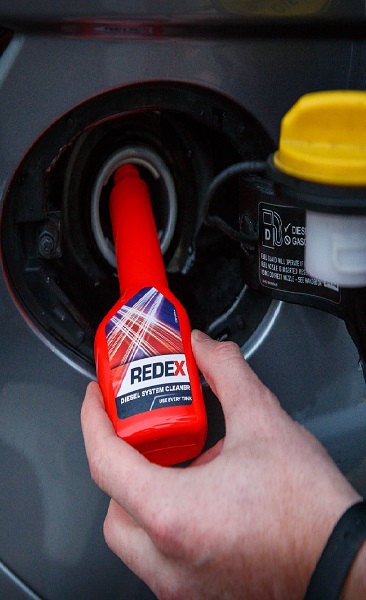
FAQ
Does Fuel Injector Cleaner Work?
Many of the claims made by fuel system cleaners haven’t been scientifically proven, and there’s no way to know if they’ll work for you. Yes, they’re efficient and stop new blockages forming, but they won’t always be potent enough for removing massive deposits. The great news is that injector cleaners are affordable, so you can try a bottle in your fuel mix when you’re experiencing an issue.
When to Use Fuel Injector Cleaner?
It is recommended to use a fuel injector cleaner every 1,500 to 3,000 miles. You can also use it when you’re getting an oil change, or you notice the signs of a clogged fuel injector. These may include problems starting the vehicle, a rough feel when the car is idling, decreased gas mileage, or poor performance in general.
What Does Fuel Injector Cleaner Do?
A fuel injector cleaner cleans out the dirt, debris, and buildup inside your fuel system. When your fuel system is clogged, you are at risk of damaging other engine parts, which leads to decreased performance, affected fuel economy, and potential engine shutdown.
How Often to Use Fuel Injector Cleaner?
Many factors impact the frequency of use of a fuel injector cleaner. While some mechanics may recommend using it every 12,000 to 15,000 miles, a general rule of thumb indicates its use every 1,500 to 3,000 miles.
Still, this will depend mostly on your engine type and health. For instance, older engines may need a fuel injector cleaner before an oil change, while vehicles used in extreme weather conditions, stop-and-go traffic, and shorter distances may require a more frequent use due to a higher risk of carbon buildup.
How Much Fuel Injector Cleaner to Use?
One bottle of a fuel injector cleaner is usually enough for one tank. Still, if you have a smaller or a larger fuel tank, you can add more or less of the cleaner. It is recommended to check the instructions before you pour the cleaner.
Why Use Fuel Injector Cleaner?
A fuel injector cleaner helps you keep your fuel system clean from carbon buildup, preventing the formation of deposits on the injectors. Besides, it can help you optimize your MPG and restore lost power caused by a clogged system.
Can a Fuel Injector Cleaner Damage My Engine?
It is unlikely that fuel injector cleaners will damage your engine, especially if you’re using the product from a reputable manufacturer.
What is the Difference Between Fuel Injector Cleaners and Octane Boosters?
You may consider octane boosters when your car requires more octane fuel than you can obtain. On the other hand, fuel injector cleaners are used to break up deposits accumulated on injectors and restore the fuel system’s optimum efficiency.
Additionally, It is recommended to use an octane booster when your car’s been inactive for a while, and the gas may have become bad. You can use an octane booster and fuel injector cleaner at the same time.
MORE CAR PRODUCTS REVIEWS:
- Best Synthetic Oils in 2022
- Best Oil Filters You Can Buy Today
- 5 Best Ozone Generators for Cars
- 10 Best Microfiber Towels for Auto Detailing
- 10 Best Tire Shine Products for High-Gloss Appearance (Gel & Spray)
- 12 Best Tire Cleaners You Can Buy Today
- 7 Best Convertible Top Cleaner Products to Buy in 2022 (Reviews & Buying Guide)
- 13 Best Car Upholstery Cleaner Products That Destroy Stains Immediately
- Car Air Freshener: 10 Best Car Scents
- Best Hail Car Covers 2022 Reviews (Ultimate Buying Guide)
- 8 Best Car Covers for Maximum Protection
- Top 10 Headlight Restoration Kit for Vehicle’s Safety and Appearance




